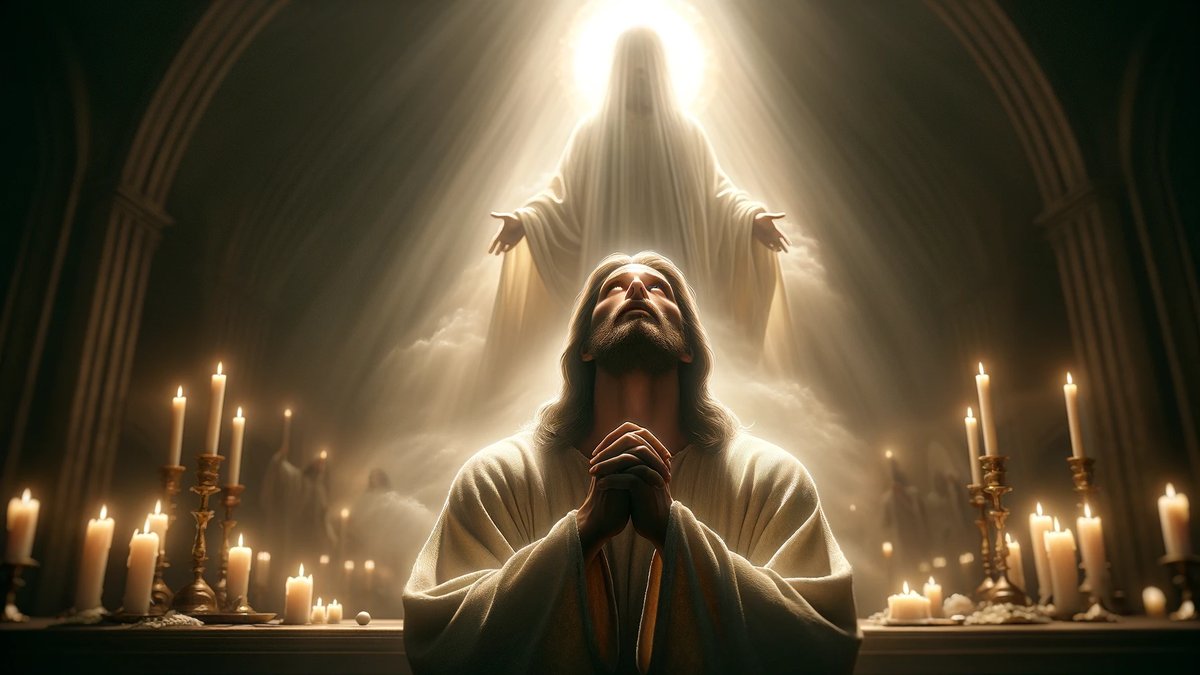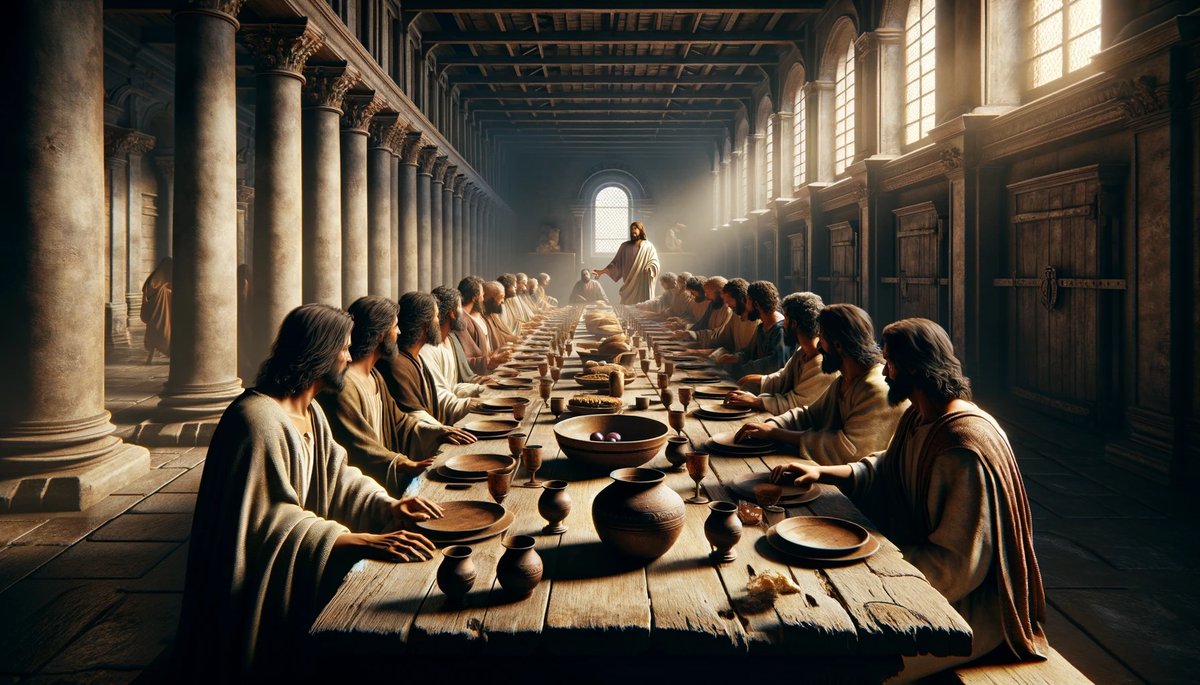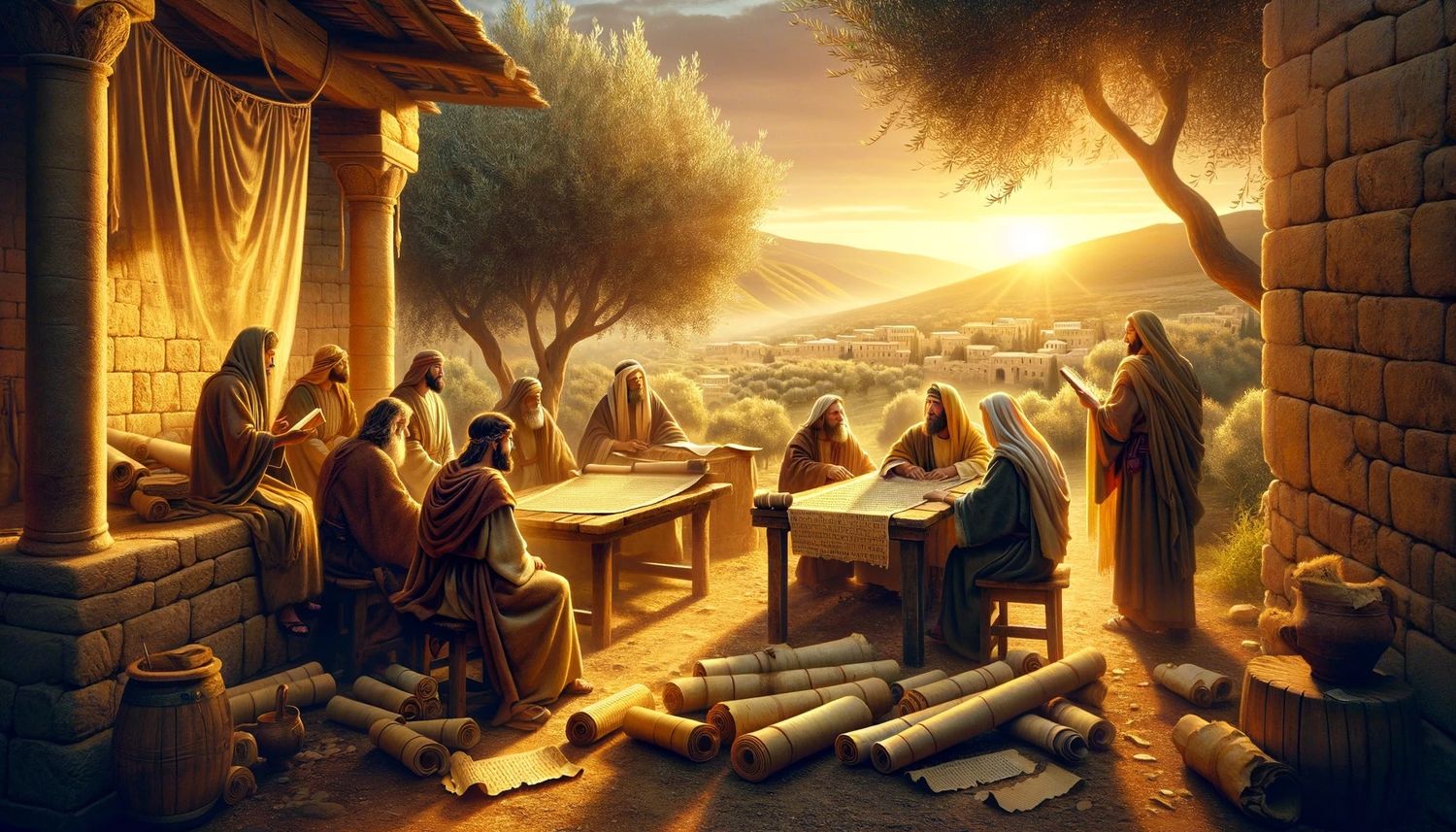Home>Christian Videos>Bible Stories>Why Is Jesus Christ Called The Lamb Of God


Bible Stories
Why Is Jesus Christ Called The Lamb Of God
Published: February 29, 2024
Ericka Andersen, an editor at Christian.net, expertly merges digital strategy with content creation, focusing on faith and societal issues. Her communication skills enhance the platform's engaging narratives, fostering meaningful dialogue on belief's impact on society.
Discover the significance of Jesus Christ being referred to as the Lamb of God in the Bible. Explore the profound meaning behind this title and its relevance in Christian theology. Gain insight into the biblical stories that highlight this powerful symbolism.
(Many of the links in this article redirect to a specific reviewed product. Your purchase of these products through affiliate links helps to generate commission for Christian.net, at no extra cost. Learn more)
Table of Contents
The Symbolism of the Lamb in Christian Tradition
The symbolism of the lamb holds significant importance in Christian tradition, representing various virtues and concepts. Here are some key aspects of the symbolism of the lamb in Christian tradition:
1. Innocence and Purity
The lamb is often associated with innocence and purity in Christian symbolism. This is derived from the gentle and meek nature of the animal, which aligns with the Christian virtues of humility and purity of heart.
2. Sacrificial Atonement
In Christian theology, the lamb symbolizes sacrificial atonement. This concept is rooted in the idea of the lamb being offered as a sacrifice to atone for sins, as seen in the Old Testament sacrificial practices.
3. Redemption and Salvation
The lamb is also a symbol of redemption and salvation in Christian tradition. This symbolism is deeply connected to the belief in Jesus Christ as the ultimate sacrificial lamb whose death and resurrection bring about the redemption and salvation of humanity.
4. Gentleness and Compassion
The lamb's gentle and compassionate nature serves as a symbol of Christ's own qualities. It reflects the teachings of Jesus regarding compassion, love, and the care for the vulnerable and marginalized in society.
Read more: Why Is Jesus Called Jesus Christ Of Nazareth
5. Victory Over Death
In Christian tradition, the lamb symbolizes victory over death and sin. This symbolism is closely tied to the resurrection of Jesus Christ, signifying triumph over the powers of darkness and the promise of eternal life.
The symbolism of the lamb in Christian tradition encompasses a rich tapestry of meanings, each contributing to the profound significance of Jesus Christ as the Lamb of God.
Old Testament References to the Lamb as a Symbol of Sacrifice
-
Passover Sacrifice: In the Old Testament, the lamb holds a prominent role as a symbol of sacrifice, particularly in the context of the Passover. According to the book of Exodus, the Israelites were instructed to sacrifice a lamb and mark their doorposts with its blood, signifying protection from the final plague inflicted upon the Egyptians. This act of sacrifice and the subsequent deliverance of the Israelites became a foundational event in Jewish history, and the symbolism of the sacrificial lamb carried profound significance.
-
Atonement Sacrifices: The Old Testament also details various sacrificial practices involving lambs as a means of atonement for sins. In Leviticus, for example, the Israelites were instructed to present lambs as sin offerings, symbolizing the transfer of guilt and the need for atonement before God. These sacrificial rituals underscored the concept of substitutionary atonement, where the innocent lamb bore the consequences of human transgressions, foreshadowing the ultimate sacrifice of Jesus Christ.
-
Prophetic Imagery: Additionally, the Old Testament contains prophetic imagery that portrays the coming of a divine figure as a sacrificial lamb. The book of Isaiah, for instance, presents a powerful depiction of the suffering servant who is led like a lamb to the slaughter, bearing the iniquities of humanity. This prophetic portrayal serves as a prefiguration of Jesus Christ, emphasizing the redemptive role he would fulfill as the sacrificial lamb for the salvation of mankind.
-
Symbolism of Innocence and Purity: The sacrificial lamb in the Old Testament also embodies the symbolism of innocence and purity. Its unblemished nature was a crucial requirement for sacrificial offerings, highlighting the significance of presenting the finest and purest offering to God. This emphasis on the unblemished lamb as a symbol of purity foreshadowed the sinless nature of Jesus Christ, who, as the Lamb of God, would offer himself as the ultimate atoning sacrifice for humanity's sins.
-
Foreshadowing Christ's Sacrifice: The Old Testament references to the sacrificial lamb serve as a profound foreshadowing of the redemptive work of Jesus Christ. The sacrificial practices and prophetic imagery surrounding the lamb laid the groundwork for understanding the significance of Christ's sacrificial death and its fulfillment of God's plan for the salvation of humanity. These references established a powerful theological framework that finds its ultimate fulfillment in the person and work of Jesus Christ as the Lamb of God.
Jesus Christ as the Ultimate Sacrificial Lamb
-
Fulfillment of Prophecy: The concept of Jesus Christ as the ultimate sacrificial lamb finds its roots in the fulfillment of Old Testament prophecies. Throughout the Hebrew Scriptures, there are numerous prophetic references to a future figure who would serve as a sacrificial offering for the atonement of sins. In the New Testament, these prophecies are seen as finding their fulfillment in the person of Jesus Christ, who, through his sacrificial death on the cross, embodies the ultimate fulfillment of the sacrificial lamb imagery.
-
Redemptive Sacrifice: Jesus Christ's sacrificial role as the Lamb of God is central to Christian theology, representing the redemptive sacrifice that reconciles humanity with God. The New Testament portrays Jesus as the sacrificial lamb whose death serves as the ultimate atonement for the sins of humanity. This sacrificial act is understood as the means through which God's justice and mercy intersect, offering the gift of salvation to all who believe in Christ's atoning work.
-
Unblemished and Pure: In Christian belief, Jesus Christ is regarded as the unblemished and pure sacrificial lamb whose sinless nature qualifies him as the perfect offering for the redemption of humanity. This parallels the requirement in the Old Testament sacrificial system for an unblemished lamb to be offered as a sin offering, emphasizing the purity and completeness of Christ's sacrifice on behalf of humanity.
-
Substitutionary Atonement: The sacrificial death of Jesus Christ is viewed through the lens of substitutionary atonement, where he takes upon himself the consequences of human sin. This theological concept reflects the idea that Jesus, as the sacrificial lamb, serves as a substitute for humanity, bearing the penalty of sin and providing a way for reconciliation with God. His sacrificial death is seen as the ultimate expression of God's love and grace toward humanity.
-
Eternal Redemption: The sacrificial role of Jesus Christ as the Lamb of God extends beyond temporal atonement, offering the promise of eternal redemption. Through his sacrificial death and subsequent resurrection, Jesus provides the pathway to eternal life and reconciliation with God. This aspect of his sacrificial role emphasizes the transformative and enduring impact of Christ's redemptive work, offering hope and assurance to believers.
-
Central to Christian Faith: The understanding of Jesus Christ as the ultimate sacrificial lamb is foundational to the Christian faith, shaping core beliefs about salvation, forgiveness, and the nature of God's redemptive plan. His sacrificial role as the Lamb of God stands as a profound demonstration of God's love and provision for humanity, inviting individuals to embrace the gift of salvation through faith in Christ's atoning sacrifice.
The portrayal of Jesus Christ as the ultimate sacrificial lamb in Christian theology reflects the profound significance of his redemptive work, offering a powerful symbol of atonement, redemption, and the fulfillment of God's plan for the salvation of humanity.
The Lamb of God in the New Testament
-
John the Baptist's Declaration: In the New Testament, the title "Lamb of God" is prominently attributed to Jesus Christ by John the Baptist. In the Gospel of John, John the Baptist declares, "Behold, the Lamb of God, who takes away the sin of the world!" (John 1:29). This proclamation serves as a pivotal moment in the narrative, identifying Jesus as the long-awaited sacrificial lamb whose redemptive mission is to provide atonement for humanity's sins.
-
Sacrificial Imagery: The New Testament further develops the symbolism of Jesus as the Lamb of God through sacrificial imagery. The portrayal of Jesus as the sacrificial lamb is intricately woven into the narrative of his crucifixion, emphasizing the parallel between his sacrificial death and the Old Testament sacrificial practices. This imagery underscores the redemptive purpose of Christ's sacrifice, aligning with the theological significance of atonement and salvation.
-
Passover Symbolism: The New Testament also establishes a connection between Jesus as the Lamb of God and the symbolism of the Passover lamb. In the Gospel accounts of the Last Supper, Jesus institutes the sacrament of the Eucharist, drawing upon the Passover tradition and imbuing it with new meaning. This association underscores the redemptive significance of Jesus' sacrificial role, framing his death and resurrection within the context of deliverance and liberation from sin.
-
Victorious Lamb: The New Testament presents Jesus as the victorious Lamb who triumphs over the powers of sin and death. The book of Revelation portrays a vision of the exalted Christ as the Lamb who was slain, yet stands victorious. This imagery conveys the transformative impact of Christ's sacrificial death, symbolizing the ultimate victory over the forces of darkness and the assurance of eternal life for believers.
-
Redemptive Purpose: The New Testament elucidates the redemptive purpose of Jesus as the Lamb of God, emphasizing the fulfillment of God's plan for the salvation of humanity. The sacrificial imagery surrounding Jesus' crucifixion underscores the profound nature of his atoning work, offering a pathway to reconciliation with God and the restoration of humanity's relationship with the divine.
-
Eternal Significance: The portrayal of Jesus as the Lamb of God in the New Testament extends beyond historical narrative, carrying eternal significance. This symbolism encapsulates the enduring impact of Christ's redemptive mission, offering hope, and assurance to believers across generations, transcending temporal boundaries and pointing to the eternal implications of his sacrificial role.
The New Testament's portrayal of Jesus as the Lamb of God enriches the symbolism of sacrificial atonement, redemption, and victory, underscoring the profound theological significance of Christ's redemptive mission in Christian faith and doctrine.
Read more: Why Is Jesus Christ The Son Of God
The Significance of Jesus Christ as the Lamb of God in Christian Theology
-
Atonement and Redemption: The significance of Jesus Christ as the Lamb of God in Christian theology is deeply rooted in the concepts of atonement and redemption. The sacrificial imagery associated with the lamb underscores the redemptive purpose of Christ's mission, emphasizing the reconciliation of humanity with God through his sacrificial death. This aspect of Christian theology highlights the centrality of Christ's atoning work as the means through which sin is forgiven and the relationship between God and humanity is restored.
-
Substitutionary Atonement: The portrayal of Jesus as the Lamb of God also embodies the theological concept of substitutionary atonement. In Christian theology, this concept reflects the belief that Jesus, as the sacrificial lamb, serves as a substitute for humanity, bearing the penalty of sin on their behalf. This understanding emphasizes the selfless and redemptive nature of Christ's sacrifice, offering a pathway for individuals to receive forgiveness and salvation through faith in his atoning work.
-
Ultimate Sacrifice: Jesus Christ as the Lamb of God represents the ultimate sacrifice in Christian theology. The symbolism of the lamb as a sacrificial offering finds its fulfillment in the person of Jesus, whose sacrificial death on the cross is regarded as the culmination of God's redemptive plan for humanity. This portrayal underscores the profound nature of Christ's sacrifice, signifying the completeness and sufficiency of his atoning work for the salvation of humanity.
-
Victory Over Sin and Death: The significance of Jesus as the Lamb of God also conveys the victorious triumph over sin and death. In Christian theology, the sacrificial imagery of the lamb is intertwined with the narrative of Christ's resurrection, symbolizing the victory over the powers of darkness and the assurance of eternal life for believers. This aspect of Christ's sacrificial role offers hope and assurance, emphasizing the transformative impact of his redemptive mission on the lives of believers.
-
Central to Christian Faith: The significance of Jesus Christ as the Lamb of God holds a central place in Christian faith and theology. This symbolism encapsulates core beliefs about the nature of salvation, forgiveness, and the divine plan for the redemption of humanity. The portrayal of Jesus as the sacrificial lamb serves as a foundational tenet of Christian theology, shaping the understanding of God's redemptive love and the transformative power of Christ's atoning sacrifice in the lives of believers.
-
Eternal Reconciliation: The significance of Jesus as the Lamb of God extends beyond temporal implications, carrying eternal significance in Christian theology. This symbolism points to the enduring impact of Christ's redemptive mission, offering the promise of eternal reconciliation with God and the assurance of everlasting life. The portrayal of Jesus as the Lamb of God underscores the eternal implications of his sacrificial role, inviting individuals to embrace the gift of salvation and the hope of eternal redemption through faith in Christ.
The significance of Jesus Christ as the Lamb of God in Christian theology encompasses profound theological themes of atonement, redemption, victory, and eternal reconciliation, shaping core beliefs about the redemptive work of Christ and its transformative impact on the lives of believers.













